| |||||
| Decades: | |||||
|---|---|---|---|---|---|
| See also: | |||||
Events in the year 1893 in Bulgaria .
| |||||
| Decades: | |||||
|---|---|---|---|---|---|
| See also: | |||||
Events in the year 1893 in Bulgaria .
| | This section needs expansion. You can help by adding to it. (August 2020) |

Bulgaria, officially the Republic of Bulgaria, is a country in Southeast Europe. It is situated on the eastern flank of the Balkans, and is bordered by Romania to the north, Serbia and North Macedonia to the west, Greece and Turkey to the south, and the Black Sea to the east. Bulgaria covers a territory of 110,994 square kilometres (42,855 sq mi), and is the sixteenth-largest country in Europe. Sofia is the nation's capital and largest city; other major cities are Plovdiv, Varna and Burgas.
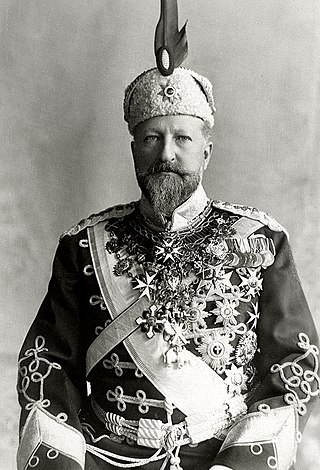
Ferdinand , born Ferdinand Maximilian Karl Leopold Maria of Saxe-Coburg and Gotha, was the second monarch of the Third Bulgarian State, firstly as ruling prince (knyaz) from 1887 to 1908, and later as king (tsar) from 1908 until his abdication in 1918. Under his rule Bulgaria entered the First World War on the side of the Central Powers in 1915.

Alexander Joseph, known as Alexander of Battenberg, was the first prince (knyaz) of the Principality of Bulgaria from 1879 until his abdication in 1886. The Bulgarian Grand National Assembly elected him as Prince of autonomous Bulgaria, in 1879. He dissolved the assembly in 1880 and suspended the Constitution in 1881, considering it too liberal. He restored the Constitution in 1883, leading to open conflict with Russia that made him popular in Bulgaria. Unification with Eastern Rumelia was achieved and recognised by the powers in 1885. A coup carried out by pro-Russian Bulgarian Army officers forced him to abdicate in September 1886. He later became a general in the Austrian army.

Konstantin Josef Jireček was an Austro-Hungarian Czech historian, politician, diplomat, and Slavist. He was the founder of Bohemian Balkanology and Byzantine studies, and wrote extensively on Bulgarian and Serbian history. Jireček was also a minister in the government of the Principality of Bulgaria for a couple of years.

The Macedonian Struggle was a series of social, political, cultural and military conflicts that were mainly fought between Greek and Bulgarian subjects who lived in Ottoman Macedonia between 1893 and 1912. The conflict was part of a wider guerilla war in which revolutionary organizations of Greeks, Bulgarians and Serbs all fought over Macedonia. Gradually the Greek and Bulgarian bands gained the upper hand. Though the conflict largely ceased by the Young Turk Revolution, it continued as a low intensity insurgency until the Balkan Wars.
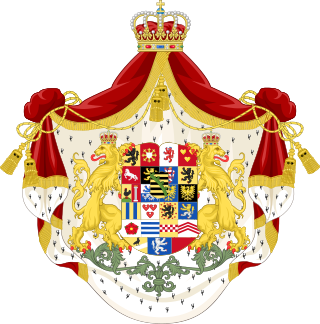
The House of Saxe-Coburg and Gotha is a European royal house. It takes its name from its oldest domain, the Ernestine duchy of Saxe-Coburg and Gotha, its members later sat on the thrones of Belgium, Bulgaria, Portugal, and the United Kingdom and its dominions.

Vasil Nikolov Zlatarski was a Bulgarian historian-medievalist, archaeologist, and epigraphist.

Todor Ivanchov was a supporter of Vasil Radoslavov who served as Prime Minister of Bulgaria from 13 October 1899 to 25 January 1901.

Dimitar Nikolov Petkov was a leading member of the Bulgarian People's Liberal Party and the country's Prime Minister from 5 November 1906 until he was assassinated in Sofia the following year.
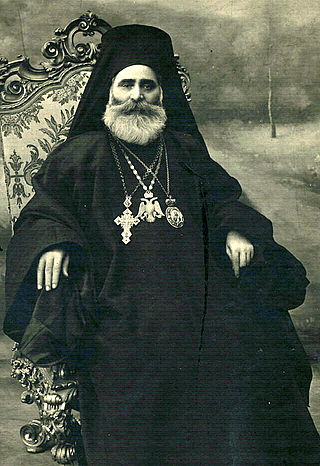
Meletius was primate of the Church of Greece from 1918 to 1920 as Meletius III, after which he was Ecumenical Patriarch of Constantinople as Meletius IV from 1921 to 1923 and Greek Patriarch of Alexandria as Meletius II from 1926 to 1935. He is the only man in the history of the Eastern Orthodox Church to serve successively as the senior bishop of three autocephalous churches.

The Bulgarian Greek Catholic Church is a sui iuris ("autonomous") Eastern Catholic church based in Bulgaria. As a particular church of the Catholic Church, it is in full communion with the Holy See. The Church's liturgical usage is that of the Byzantine Rite in the Bulgarian language. The Church is organised as a single eparchy — the Bulgarian Greek Catholic Eparchy of Sofia.

Mezdra is a town in northwestern Bulgaria, part of Vratsa Province. It is located on the left bank of the Iskar River just north of its gorge through the Balkan Mountains.
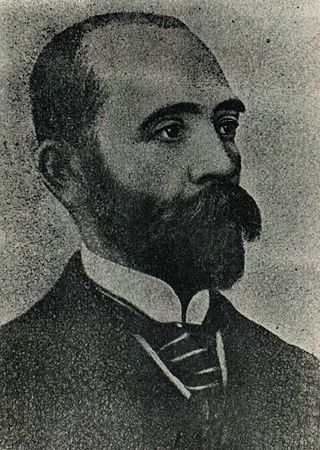
Vasil Kanchov was a geographer, ethnographer and teacher who served as Minister of Education of Bulgaria.

Manush Georgiev, better known as Manush Voivoda was a revolutionary from Ottoman Macedonia and a member of the Internal Macedonian Revolutionary Organization. He graduated from the Bulgarian schools in Strumica and Serres, and was later appointed as a teacher in the villages of Barbarevo, Robovo, Borievo and Stinik.
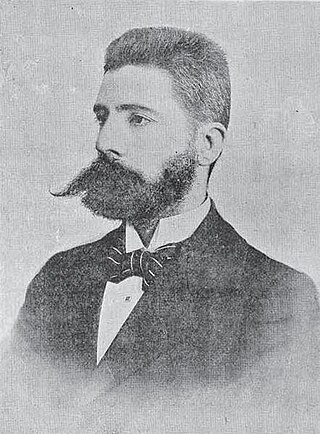
Ivan Hadzhinikolov was a Macedonian Bulgarian revolutionary, leader of the revolutionary movement in Macedonia and Adrianople vilayet. He was among the founders of the Bulgarian Macedonian-Adrianople Revolutionary Committees (IMARO) in October 1893. He is considered a Macedonian by the historiography in North Macedonia.

Football is the most popular sport in Bulgaria. It was introduced in 1893–1894 by Swiss gymnastics teachers invited to the country. A football match was first played in Varna's High School for Boys in 1894, where it was introduced by Georges de Regibus, and the game was brought to Sofia by Charles Champaud the following year. The rules of the game were published in Bulgarian by Swiss teachers in the Uchilishten pregled magazine in 1897, and football continued to gain popularity in the early 20th century. Among the founders of the Turkish team Galatasaray in 1905 was the Bulgarian Lycée de Galatasaray student Blagoy Balakchiev, and the first Bulgarian club, Futbol Klub, was established in Sofia in 1909 on the initiative of Sava Kirov. Botev Plovdiv was founded in 1912, Slavia Sofia in 1913, and Levski Sofia in 1914. The Bulgaria national football team debuted on 21 May 1924 in a 1924 Summer Olympics qualifier, losing 0–6 to Austria in Vienna. What is today CSKA Sofia was established on 5 May 1948. In the 1950s and 1960s Bulgarian football achieved its biggest Olympic success, being third in the 1956 Summer Olympics in Melbourne and second in the 1968 Summer Olympics in Mexico City, also finishing fifth in Euro 1968. In 1962, Bulgaria first qualified for a FIFA World Cup tournament, in total of seven participations to date. In the 1986 FIFA World Cup, Bulgaria did reach the round of 16. Then, in the 1994 FIFA World Cup, came Bulgaria's biggest World Cup success, the fourth place, the elimination of reigning world champions Germany and Hristo Stoichkov's top goalscorer prize. Bulgaria is also three times European champion in under-19, three times Balkan champion, and three times Balkan Youth champion. The titles won by the national team make Bulgaria one of the best performing nations in European football competitions.

Borys Borysovych Tashchy is a Ukrainian professional footballer who plays as a forward or attacking midfielder for German club Erzgebirge Aue.
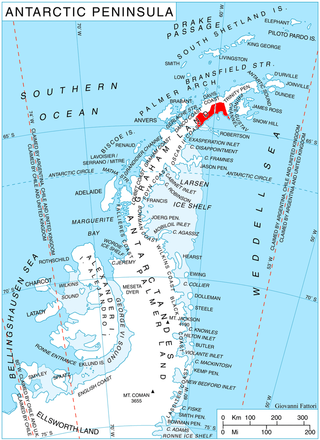
Aleksiev Glacier is the 10.5 km long and 3 km wide glacier on Nordenskjöld Coast in Graham Land situated northeast of Kladorub Glacier and south of the glacier featuring Arrol Icefall. It drains the southeast slopes of Detroit Plateau, and flows east-southeastwards to enter Desislava Cove in Weddell Sea. The feature is named after the Bulgarian artist and writer Rayko Aleksiev (1893–1944).

Parliamentary elections were held in Bulgaria on 30 July 1893. Following changes to the constitution earlier in the year, the number of members of the National Assembly was reduced.
Events in the year 1921 in Bulgaria.